Actually, I don't plan on doing that, since I have to duplicate that research in one of the other three papers I'm writing this spring because I got bored and starting searching CFP sites, and that just never ends well. Sue me, I'm an incorrigible nerd.
Anyway, speaking of being a horrible huge giant nerdface, I went to see The Amazing Spiderman 2 this weekend - Friday, to be specific - and let me tell you that it was fabulous and enjoyable and sad and wonderful and pretty much everything I expected it to be. Which, sadly, includes being about twenty minutes too long, because I guess that's a thing now? That everything is just a little bit too long? I don't like that thing.
But yeah. The movie was great and you should totally go see it. I'm putting that up front because I know that some people (mostly in my family) only read these reviews to figure out if they should go see a movie, and then they see it, and then, maybe, they come back and actually read the review. You know who you are. Shame on you.
I've never really made a secret of the fact that I don't much like the Sam Raimi Spiderman trilogy, but it hasn't really come up on here a lot, so let me make this clear. I don't hate it, but I also don't like it, and I like this version, the Amazing Spiderman franchise, a whole hell of a lot better. For a couple of reasons, but let's talk about the biggest and most important: Peter Parker is a good guy.
Now, if that seems like an obvious sentence to you, then congratulations! You know and understand this character. But I think that it's actually more complex than it immediately appears, and I think that this movie franchise in particular is freaking awesome at showcasing exactly what that means. Because, seriously, what does it mean to be a good guy? Not just a good guy as in someone who beats up the bad guys, but a good guy as in a good person. The kind of teenage boy who buys his aunt eggs as an apology, or who takes the time to make a little kid feel better about himself, or who just plain old wants to help people.
That's what I mean when I say that Peter Parker is a good guy. He's fundamentally and inherently good. Which can be kind of a problem for some writers to handle, it would seem. From the whole debate that's not really a debate over whether or not Captain America should be a dick, to the issue of grittying up Superman in order to make Man of Steel more interesting, we seem to be having trouble with the concept that sometimes people are actually good, and that doesn't make them boring. It actually makes them much more interesting because they have to live in this messy place.
SPOILERS
The movie starts at Peter (Andrew Garfield) and Gwen's (Emma Stone) graduation from high school. Peter, of course, is late because he's off fighting crime and getting shot at, and Gwen is annoyed that he totally missed her valedictorian speech (which was a lot better than the valedictorian's speech at my graduation, let me tell you). That night, though, still wracked by guilt over kind of sort of not really but that's guilt for you causing her father's death in the previous film, Peter and Gwen have a fight, and Gwen dumps Peter's chauvanistic butt.
It's kind of a harsh start to movie, honestly. We're all prepped for two hours of the Peter/Gwen love train, and there she is, laying down the law. But she's not really wrong - and we'll have more on that and how freaking much I love Gwen in this movie later this week (Strong Female Character Friday, to be exact). Moving on!
The film covers a pretty broad time frame, mostly following Peter on his first year out of high school. There's no money for him to go to college, so he ends up bumming around New York, fighting crime and selling shots of himself as Spidey to make money, and helping out Aunt May around the house. You can kind of tell that Aunt May is a little worried that Peter is so directionless, but she handles it well. And Peter does have a direction, it's just that his direction is, well, towards danger. Which is probably worrisome for her.
Just as Peter is about to shuffle off into a melancholic haze, he's woken up when Norman Osborn (Chris Cooper) dies and his childhood friend, Harry Osborn (Dane DeHaan), comes back into town to run the company and inherit his father's legacy. Like most rich kids, Harry is weird and a little insensitive and super duper intense. But mostly, he's obsessed with not dying, since he just found out that he shares his father's fate, due to an intense genetic disorder that's going to make him look, well, like a goblin.
Harry doesn't take the news well.
Nor does he take Peter's apparent complicatedness well either. From Peter's weird relationship with Gwen (they're not dating, but they're not really single either because feelings), to his constant hiding and bruises and general crazy, Harry knows there's something Peter is hiding. And he's pretty sure that something is a friendship with Spiderman.
Which would work great for Harry, if only Peter would be a mensch and grab some of the Spiderman's blood so that Harry could inject himself with it and then get better probably maybe or also die. Peter is understandably not in favor of this plan, and tries to reason with Harry, but that's a no can do. Harry's gone round the bend.
Meanwhile, a lowly Oscorp employee named Max (Jamie Foxx), who was actually super brilliant but no one ever paid attention to, develops a creepy and genuinely terrifying obsession with Spiderman, only to get accidentally electrocuted to death on his birthday, and resurrect as a giant electricity man with a bone to pick with the Spiderman. Max, or Electro as he later prefers to be called, is pants-wettingly crazy, and it's a great performance, but man, I haven't been so genuinely scared of a bad guy in a long time. Because Max isn't mean, exactly, he's just deeply crazy and neglected and broken. It's good writing, and he is really scary.
Eventually Harry finds out about Max, and they team up to murder Spiderman and get Harry what he wants, which is access to the same spider venom that made Peter superhuman. Only it turns out that it just plain won't work. Peter's father made those spiders, and he fused them with his own DNA. Only a close relative match would manage to survive the transformation. So Peter's okay, but Harry is screwed. And that's how we end up with the Green Goblin in the mix too.
Okay, you may have gathered this by now, but this movie doesn't have a super linear plot structure. It's very scattered, but that's not a bad thing. Maybe scattered isn't the right word. Loose? The story is spread out, with Peter looking into his parents and what really happened to them in between saving people and pining over Gwen, who mixes up college classes and interviewing for an Oxford fellowship with a work study at Oscorp and investigating Max's suspicious death and also pining over Peter.
Then we've got Harry and his baggage, May (Sally Field) and her fear that she's losing her son, Max's whole thing, and of course, the usual "What? No! I'm not Spiderman! I'm a normal human teenager. Promise." shenanigans.
It's a packed movie. And while the plots aren't all nailed down to a single track that's leading us ever forward and towards the climax, that's not a bad thing. It honestly is a good movie, especially because the emotional points all track. It's a year in the life of Spiderman, but that's a pretty cool concept for a film.
At the end, though, it does all come together, and of course it's heartbreaking and cruel and exactly what we were all expecting. That doesn't make it bad writing, just...sad.
I'm talking, obviously, about Gwen Stacy's death and the suckiness that it was. But as much as it pains me to admit this, her death really worked in the narrative. It was sad and I hate it when they kill of female characters, especially when they fridge a girlfriend, but we all knew Gwen was going to die, just like we all knew Bucky wasn't going to make it. It's in the comics, and it's seminal, and you know they're not just ignoring that.
What really works for me, though, is that Gwen's death is really the least significant part of her character. Or rather, it's significant because it is a full and perfect extension of who she is - she died because she refused to stand back and wait for someone else to save the city. She was there in the first place because she knew she could help, and she wasn't going to live a safe boring life when she could be so much more. I love Gwen. And I love that, as she makes it perfectly clear to Peter many times in this movie, "I make my choices. Me!"
Anyway. It's gut-wrenching and shocking and devastating, and that's okay.
We'll have time to talk more about Gwen later (Friday), so for now, I want to go back to the whole thing about Peter being a fundamentally good person and why I love these movies.
You see, the end of the film has Peter hanging up the mask because he got Gwen killed and he got her father killed (well, that's how he sees it, anyway), and he is doing more harm than good. And then he puts it back on. Because Peter Parker wants to help people. He wants to save people, and that is what Gwen loved about him.
Peter loves being Spiderman. He loves it. Really really really adores it. Not because he loves the power it gives him, or the fame, or even the superpowers (though, I suppose he does enjoy those), but because he loves helping people. Making them feel good about themselves. Giving them hope.
The past couple of weeks, there's been a conversation online about collateral damages, and how the different superheroes react to the civilians in distress in their stories. Like, in Man of Steel, the ending fight levels the city of Metropolis, killing presumably hundreds of thousands, if not millions, of people. Captain America: The Winter Soldier, by contrast, has scenes where the characters run around telling people to get out of the way. And Avengers coordinated the whole final boss fight to be the heroes trying to keep the damage contained and get people to safety.
But none of that can really compare to Spiderman. Especially not to this movie. While those other films are all ostensibly about protecting people and saving lives, they're usually about something bigger too. The fate of the planet, the fate of the universe, something big. Something big enough that a few scared people on a bridge aren't a big deal.
With Spiderman, though, the civilians are the whole point. Spiderman doesn't do big. He doesn't fight because he has philosophical values to uphold, or against evil organizations intent on global domination. He doesn't fight because he has to or because the weight of the world is on his shoulders. I would actually argue that in fact he doesn't fight at all.
Peter Parker doesn't fight supervillains. He saves people.
It's a different perspective, basically. A good Spiderman movie isn't about beating the bad guy, it's about making sure no one gets hurt, including the bad guy. If you notice, in this film (if you've seen it), the first time Peter goes up against Max/Electro, he isn't fighting him at all. Peter's just trying to talk him down, get him out of the crowded place, and they'll go somewhere and talk about what's going on and how Max got like this.
When it all inevitably goes pear-shaped, Peter's still not really trying to fight him, he's saving all of the people trapped in Times Square. It's not about beating the bad guy, it's about being a good guy.
The whole movie, loose as it is, is really about that. In fact, I would argue, that's why it's loose and that's why loose works for it.
The movie has tons of scenes where Peter is just helping people out. There's an adorable stinking scene where Spiderman intervenes between a kid and some bullies. He doesn't do anything, just hops down and the kids run away, but after that he actually takes the time to fix the kid's science experiment, walk him home, get to know him.
And it's worth noting that Max's whole insane obsession with Spiderman came because Spidey saved him and took the time to be nice to him. Later, in Times Square, when Max is hurt that Peter doesn't remember him, it's actually really impressive, because Peter actually does. It takes him a minute to get the name right, but still. He remembers saving this guy and his blueprints almost six months ago. Dude. I can't even remember the names of the guys at my comic book shop, and I see them literally every week.
Peter likes people. He wants to help them. The great conflict in Spiderman come when Peter can't decide who needs his help more. The question is never whether or not Spiderman is going to save someone, it's how.
This does bring me back a little bit to the Sam Raimi Spiderman movies and why I don't like them - basically, I never felt like this Peter Parker was a fundamentally good guy. He always felt so...selfish. And kind of creepy. Like his whole obsession with Mary Jane honestly skeeved me out. But mostly, it's this. It's that he didn't make people feel better about themselves. That the movies weren't about how Peter could best help the people around him, but how the people around him could best help Peter.
I don't like that. I like a world with Amazing Spiderman. I like a world where the superhero saving me takes the time to find out my name and what I like and walks me home. Why? Because I want to be that kind of person, the kind that cares more about saving people than winning. And I need a good example.
Actually, you know what? I need two of them.

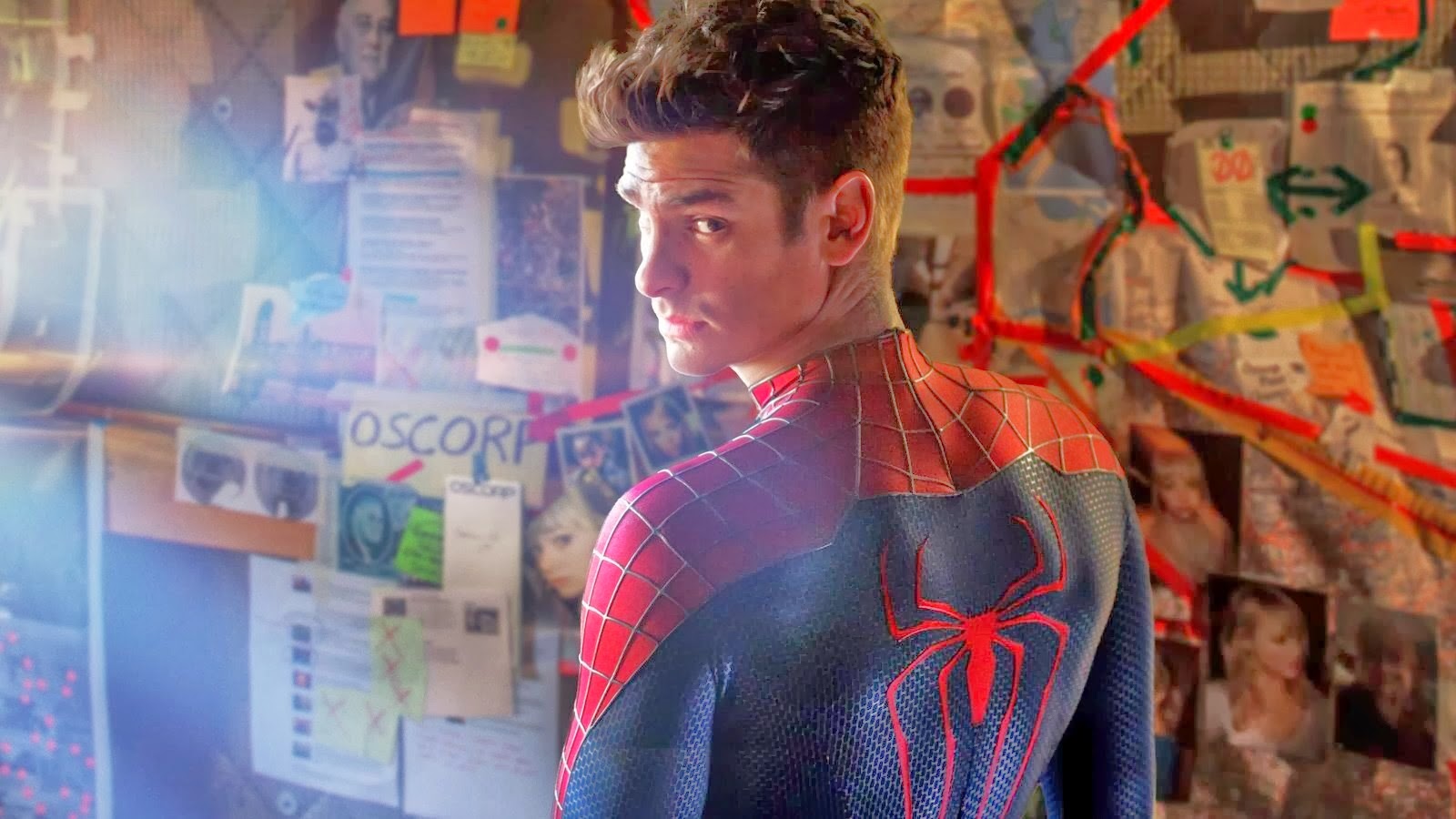
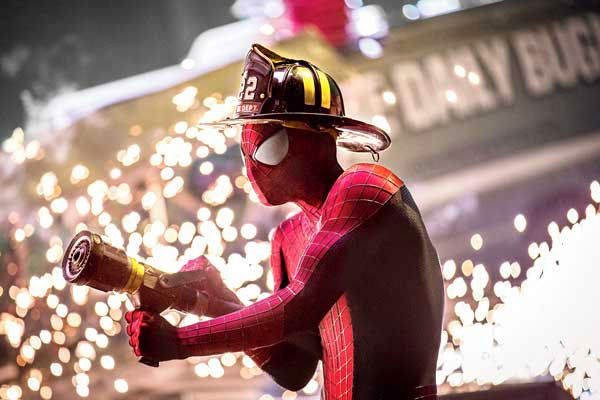

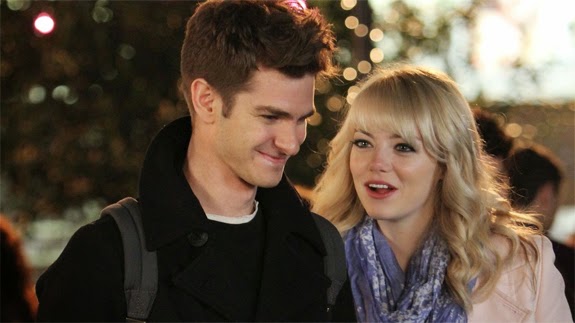

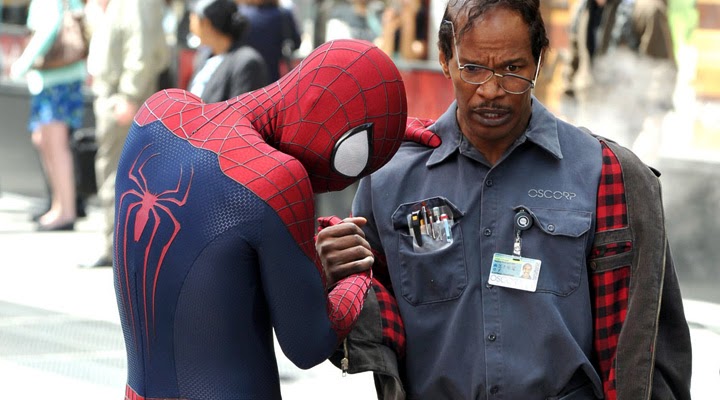
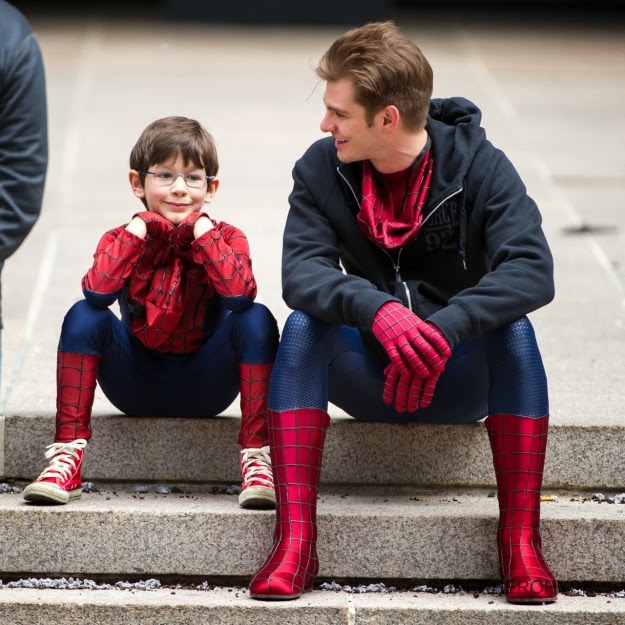
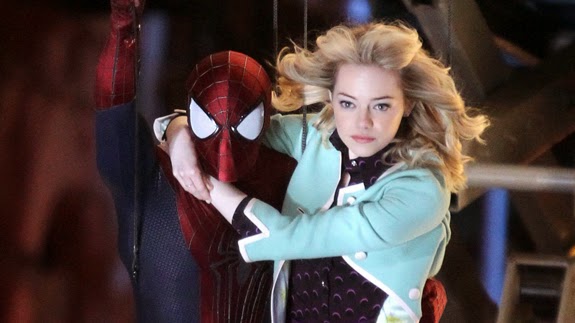
I'm of two minds about this - on the one hand, Spider-Man is definitely and fundamentally all about saving people, but I think Peter Parker kind of isn't? That's actually one of the things I like most about the character is that, even to this day, he still has an inner core of selfishness that he fights against. His first instinct when he got his powers was to make money and fuck up jocks, because he was a bitter nerd who hated the world, and his first instinct was to emulate the behaviour of the Flash Thompsons of the world rather than be better than them. Guilt is his fundamental driving force, and it only helps his character that quite often he feels guilty about things that are actually his fault. Parker Luck and the demands of the job are certainly reasons why Peter is kind of a bad friend, for example, but a lot of good Spidey stories also make it clear that Peter being chronically self-centered and self-pitying is a big part of it too.
ReplyDeleteI'd be interested to find out how he reacts to Gwen's death in the movie - in the original story, he beats up a cop, completely ignores a desperate Harry going through withdrawal, and then there's the beautiful epilogue where he says the harshest shit he can think of to MJ and tells her to fuck off out of his apartment, but she quietly closes the door and stays with him instead.
That's interesting. I think a lot of that comes down to the different character interpretations. I've quite liked how Amazing Spiderman focuses more on the "Peter as concerned human" rather than the "Peter as bitter nerd" version from the Sam Raimi films. Also, as my friend Patrick (pieceofcape.blogspot.com) pointed out, everything good happens to Spiderman. Everything bad happens to Peter Parker. Which is an interesting dynamic.
DeleteBasically, Peter Parker is a Hufflepuff.
ReplyDeleteYES. A THOUSAND TIMES YES.
Delete